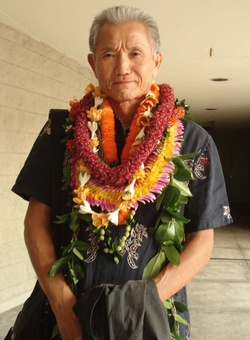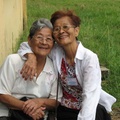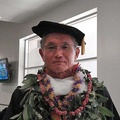Read part 2 >>
Playing the sanshin and singing traditional Okinawan songs were also instrumental in Uchināguchi being passed on in the immigrant communities. Even in the South American Uchinanchu communities, Uchināguchi was spoken along with Portuguese and Spanish.
I remember meeting a Nisei Okinawan in Brazil 20 years ago. At first, I spoke to her in Japanese, but she didn’t understand me. I didn’t know what to do because I didn’t know any Portuguese. I was at a loss for words, so I tried speaking Uchināguchi—and she responded, in Uchināguchi.
I was thoroughly surprised that a Nisei born in Brazil who had never been to Okinawa could speak fluent Uchināguchi. I realized that her Uchināguchi had the same northern Okinawa accent of her parents. That opened my eyes to the power of words. We experienced the same thing in Argentina and Peru, as well.
Seventy percent of the Japanese in Peru and Argentina are Okinawan, and within the Asian communities, there is more Uchināguchi spoken than Japanese. In Lima, Peru, we interviewed a baker, Anken Moromizato, who spoke only Uchināguchi and made us use Japanese subtitles. He can speak Japanese, but spoke only Uchināguchi. He was that proud of his Uchināguchi. I, myself, learned a significant amount of Uchināguchi during our filming in South America.
In this way, the world’s Uchinanchu have retained the Okinawan spirit of mutual aid, love for their homeland, and love and caring for one another that the Issei brought from Okinawa. I believe that within the Okinawan spirit and traditional culture lies the fundamental uniqueness of the Okinawan community.
This spirit existed in Uchinanchu communities worldwide. It had been passed on from Nisei to Sansei and Sansei to Yonsei and had become the foundation and identity of the Uchinanchu in their new multicultural and multiethnic communities.
This can be seen in the Okinawan community here in Hawai‘i. In this melting pot of culture and ethnicity, there was a movement to strengthen the recognition of minorities in the 1960s and ‘70s. The Okinawan Nisei and Sansei also became interested in their own roots.
The Okinawan Festival, started in 1982, and the completion of the Hawaii Okinawa Center in 1990 were the result of such movements. I believe that it was through these movements that Hawai‘i’s Uchinanchu became aware of their identity and were able to be proud of it.
This can also be seen in the HUOA’s annual themes—“Yāninju” (“We are one family”), “Chimu Zurii” (“The beautiful harmony”), “Shinasaki” (“Okinawan spirit and heart”). They are using Uchināguchi in their activity models.
In the year 2000, I was deeply moved by the words of HUOA president Albert Miyasato at the 100th anniversary of Okinawan immigration to Hawai‘i. Mr. Miyasato stated: “I have engraved in my heart three short Japanese phrases. The first is wasureruna—do not forget. Do not forget about the hardships that the Issei went through. The second is uketsuge—pass it down. Pass down the Okinawan culture and tradition. Lastly, tsutaeru—pass it on. Pass on the Uchinanchu spirit and identity that you learned to the future generations.
Beginning with Hawai‘i, I have interviewed Uchinanchu around the globe. After having seen that many overseas communities are keeping the Okinawan spirit and traditional culture alive, I am deeply concerned about the “mother prefecture,” the “motherland” that the world’s Okinawans talk about.
In 1972, Okinawa was returned to Japan. What was under the administration of the United States was returned to Japan after the war. The Okinawan people then thought of rushing to catch up to the Mainland again and the major theme for the Okinawan people after the war became “unity with Japan.”
Influenced by the mainland Japanese businesses in their standardized ways, competition and efficiency became the primary focus and the important Uchinanchu spirit of love and caring started being ignored.
We who live in Okinawa did not notice this change, but the Uchinanchu around the globe felt the change in the Okinawan spirit.
Sixteen years ago, while interviewing Kinjou Shimabukuro, who owned a travel agency in Bolivia, he told us, “Before when we returned to Okinawa, the people would welcome us with “Munokadi” and “Chagwa nudi ike.” (Did you eat? Have some tea.) But now those kind words are gone. The people of Okinawa became distant and cold.”
After its return to Japan, Okinawa built up its social capital, which improved the quality of life. However, in making competition and efficiency the priority, the Okinawan lifestyle of nankurunaisa and tēgē (easy-going) began to fade away and Okinawan society became cramped. Uchināguchi was spoken less and less, slowly losing its presence. Even at home, people stopped speaking Uchināguchi, and young people could no longer understand it. The Nisei and Sansei from South America were often surprised that people from Okinawa did not speak Uchināguchi.
I worry that there may soon be a gap in the understanding of the Okinawan spirit and identity of the world’s Uchinanchu and the Okinawa Uchinanchu. At this rate, we will have to start an Uchinanchu “movement,” like Hawai‘i’s, in the motherland, Okinawa.
In Okinawa, there is a Worldwide Uchinanchu Festival held every five years. It was held last October, with 5,200 people from 23 countries around the world attending, including 1,000 from Hawai‘i.
The overseas participants commented:
- “The young Okinawans should be more interested in their own culture and language.”
- “From overseas, I do not feel the Okinawan culture and spirit as much as I used to.”
- “The Okinawan spirit is in its traditional arts; I want them to realize how amazing it is.”
- “It’s been 30 years since I last came from South America, but I’m shocked that nobody speaks Uchināguchi.”
Professor Shigehiko Shiramizu from Komazawa University, who volunteers making andagi at the Hawai‘i Okinawa Festival every year, stated, “Identity is not born because you are born in Okinawa, but is born by being interested in the Okinawan traditions and culture, and by practicing the Okinawan spirit of kindness and caring. At this rate, I am worried about the identity of Okinawa.”
People traveling from Okinawa to South America are often surprised that the Uchinanchu there have kept the Okinawan spirit and identity alive and often say “the Okinawan spirit is in South America.” The same happens in Hawai‘i, where Okinawan tourists are impressed by the Uchinanchu hospitality demonstrated by the Hawai‘i Uchinanchu.
There are presently 400,000 Uchinanchu worldwide. This is 10 percent of all people of Japanese descent. Okinawa’s population is 1.4 million, only 1 percent of the population of Japan. It is amazing that 1 in 10 people of Japanese descent around the world are Uchinanchu.
Over a century ago, the Issei pioneers rode the wave from Okinawa to foreign lands. They experienced hardship and spread the Okinawan spirit of mutual aid, local bonding, and tolerance around the globe. This spirit and mentality became the foundation of the Okinawan communities.
I believe that the Okinawan spirit was passed down, along with the traditional culture, from the Issei to the Nisei, Sansei to Yonsei, and gradually became the world’s Uchinanchu identity.
I believe that Mr. Miyasato’s words: “Don’t forget; pass it down and pass it on,” were meant not only for the Okinawan immigrants worldwide, but also for the Uchinanchu in Okinawa.
“Sekai no Uchinanchu” (“Uchinanchu Worldwide”) airs on NGN (Channel 677), which is available by subscription from Oceanic Times Warner Cable in Hawaii.
*This article was originally published in the Hawaii Herald on August 17, 2012. Republished on Discover Nikkei with permission.
© 2012 Hawaii Herald; Shinichi Maehara





